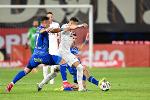The euro fell to its lowest level in Bucharest yesterday since December 2002, after both local and foreign stock market players placed aggressive "buy" orders for RON on the stock market.
The NBR calculated an exchange rate of 3.3477 RON at one euro, the lowest published since the beginning of December 2002. The euro has fallen by more than 1.3% at the official exchange rate in March alone.
Rates decreased even further on the forex market, with the euro reaching a low not seen in four years of 3.3270/3.3320 RON, almost 0.8% below the level at which it had started the day.
The analysts polled by ZF explained yesterday's aggressive move was the outcome of two main factors: a regional move made by speculative investors, generated by the publication of certain data concerning the Slovakian crown and also by the steep increase in the short-term interests on RON. Interest rates increased by more than 20% a year yesterday (such levels were common at the beginning of 2005), against a drop in liquidities.
"I think it is unlikely that we will see the RON continue to appreciate over the next few days. Any correction, however, will now have to penetrate two resistance levels, set at 3.3360 and 3.36 RON/EUR. This suggests a potential correction would not put the exchange rate back to the level at which it had been trading over the last two weeks," believes Radu Craciun, chief analyst of ABN Amro Bank. Considering the RON appreciation came amid a regional move with a limited duration, he does not expect the NBR to intervene on the market.
The NBR officials, as well as those of the International Monetary Fund, have recently pointed out that a fast-paced appreciation of the RON can generate a significant correction in the exchange rate.
However, analysts do not foresee it happening, at least not for the time being
"It is hard to believe





